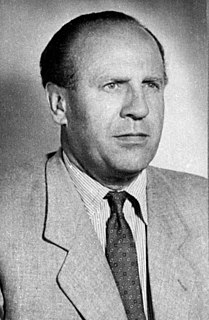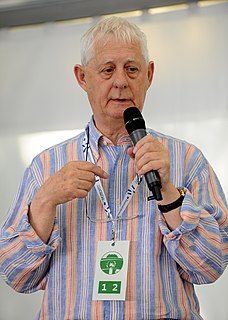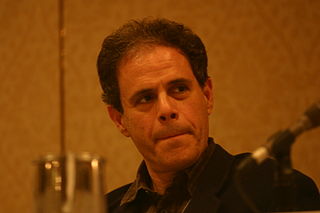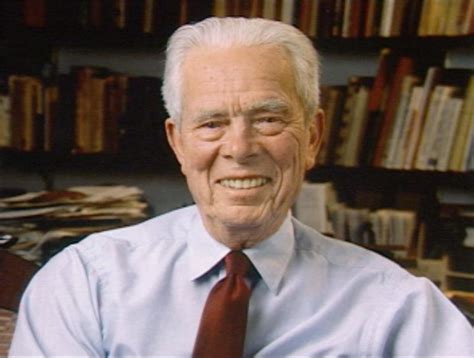Top 331 Behaving Quotes & Sayings - Page 6
Explore popular Behaving quotes.
Last updated on April 15, 2025.
The persecution of Jews in occupied Poland meant that we could see horror emerging gradually in many ways. In 1939, they were forced to wear Jewish stars, and people were herded and shut up into ghettos. Then, in the years '41 and '42 there was plenty of public evidence of pure sadism. With people behaving like pigs, I felt the Jews were being destroyed. I had to help them. There was no choice.
The world is not yet finished, but everyone is behaving as if everything was known. This is not true. In fact, the computer world as we know it is based upon one tradition that has been waddling along for the last fifty years, growing in size and ungainliness, and is essentially defining the way we do everything. My view is that today’s computer world is based on techie misunderstandings of human thought and human life. And the imposition of inappropriate structures throughout the computer is the imposition of inappropriate structures on the things we want to do in the human world.
When we speak about climate change, you're a victim of something ... which is happening with deep roots where you don't have - anything to deal with. And people just want to choose a life. That's very much important. And I think one of the key elements of the collective battle we have today, in order to fight against climate change is to provide people the ability to choose a life. To have a better life by behaving differently, by innovating, by creating new type of companies and startups, new type of activities.
Yet, isn't it strange, isn't it weird, how we can KNOW that someone is not behaving in the way we imagine, and at the same time we can be totally convinced that he is! How clever the human mind is, that it can accept two contradictory things as 'facts.' Yes, I know that in this case one 'fact' was untrue. But the human mind can KNOW something is untrue and still accept it as a 'fact,' and act on it as if it were true.
Atoms are weird stuff, behaving like active agents rather than inert substances. They make unpredictable choices between alternative possibilities according to the laws of quantum mechanics. It appears that mind, as manifested by the capacity to make choices, is to some extent inherent in every atom. The universe is also weird, with its laws of nature that make it hospitable to the growth of mind. I do not make any clear distinction between mind and God. God is what mind becomes when it passes beyond the scale of our comprehension.
War is an extraordinary condition to be in - to be, for example, in the combat information center of a warship [and behaving] as though you were merely processing credit card applications. [Instead,] the information you're processing is that an incoming missile is 15 kilometers away, now 10 kilometers away, now 5 kilometers. You have to separate yourself psychologically from the fact that your mortal existence may well end. That is the ancient reality of war.
History, the winnowing wind, never halts. We see the chaff rise, forget the waiting grain, seed of the future, fallen to the threshing floor. We never learn, but live on, slit-narrow, as if our living were a pencil line traced upon paper, behaving as trapped denizens of a flat world hemmed in by the bigoted horizon of our own making. Yet the meaning of living is a pushing back, a pulling down of the great walls and domes of fear and ignorance, is relinquishing the nest for the sky, ignorance for understanding. The look back is also a look forward.
Holly: Seriously, you don't like unicorns? What kind person doesn't like unicorns? Justine: What kind of a person doesn't like zombies? What have zombies ever done to you? Holly: Zombies shamble. I disapprove of shambling. And they have bits that fall off. You never see a unicorn behaving that way. Justine: I shamble. Bits fall off me all the time: hair, skin cells. Are you saying you disapprove of me?
There are so many things that can provide us with peace. Next time you take a shower or a bath, I suggest you hold your big toes in mindfulness. We pay attention to everything except our toes. When we hold our toes in mindfulness and smile at them, we will find that our bodies have been very kind to us. We know that any cell in our toes can turn cancerous, but our toes have been behaving very well, avoiding that kind of problem. Yet, we have not been nice to them at all. These kinds of practices can bring us happiness.
You can't make flivers without steel - and you can't make tragedies without social instability. The world's stable now. People are happy; they get what they want, and they never want what they can't get. They're well off; they're safe; they're never ill; they're not afraid of death; they're blissfully ignorant of passion and old age; they're plagued with no mothers or fathers; they've got no wives, or children, or lovers to feel strongly about; they're so conditioned that they pratically can't help behaving as they ought to behave.
It doesn't matter how bad things are, something good could happen always. And it doesn't matter how many excuses you have for behaving in an unkind manner towards others. There's never any excuse for not being kind and it's always better to be kind even if it seems pointless and that in fact is the highest wisdom - being kind. It sounds like a very noble, ethereal, simplistic idea but it's true.
Nobody needs to go anywhere else. We are all, if we only knew it, already there. If I only knew who in fact I am, I should cease to behave as what I think I am; and if I stopped behaving as what I think I am, I should know who I am. What in fact I am, if only the Manichee I think I am would allow me to know it, is the reconciliation of yes and no lived out in total acceptance and the blessed experience of Not-Two. In religion all words are dirty words. Anybody who gets eloquent about Buddha, or God, or Christ, ought to have his mouth washed out with carbolic soap.
Each human being is unique, each with their own qualities, instincts, forms of pleasure, and desire for adventure. However, society always imposes on us a collective ways of behaving, and people never stop to wonder why they should behave like that. They just accept it, the way typists accepted the fact that the QWERTY keyboard was the best possible one. Have you ever met anyone is your entire life who asked why the hands of a clock should go in one particular direction and not the other?
Filial obedience is the first and greatest requisite of a state; by this we become good subjects to our emperors, capable of behaving with just subordination to our superiors, and grateful dependents on heaven; by this we become fonder of marriage, in order to be capable of exacting obedience from others in our turn; by this we become good magistrates, for early submission is the truest lesson to those who would learn to rule. By this the whole state may be said to resemble one family.
When war is waged, it is for the purpose of safeguarding or increasing one's capacity to make war. International politics are wholly involved in this vicious cycle. What is called national prestige consists in behaving always in such a way as to demoralize other nations by giving them the impression that, if it comes to war, one would certainly defeat them. What is called national security is an imaginary state of affairs in which one would retain the capacity to make war while depriving all other countries of it.
Love involves more than just feelings. It is also a way of behaving. When Sandy said, "My parents don't know how to love me," she was saying that they don't know how to behave in loving ways. If you were to ask Sandy's parents, or almost any other toxic parents, if they love their children, most of them would answer emphatically that they do. Yet, sadly, most of their children have always felt unloved. What toxic parents call "love" rarely translates into nourishing, comforting behavior.
We're herded into schools and terrified into behaving. Taught how we're supposed to pretend to be, taught to parrot all kinds of nonsense at the flick of a switch, taught to keep our heads down and our elbows in and shut off our minds and shut off our sex. We learn we can't even piss when we have to. That's how we learn to be plastic and dumb.
I gave examples from my clinical practice of how love was not wholly a thought or feeling. I told of how that very evening there would be some man sitting at a bar in the local village, crying into his beer and sputtering to the bartender how much he loved his wife and children while at the same time he was wasting his family's money and depriving them of his attention. We recounted how this man was thinking love and feeling love--were they not real tears in his eyes?--but he was not in truth behaving with love.
To paraphrase Hemingway, people go broke slowly and then all at once. We've been slowly going broke for years, but now it's happening all at once as the world's capital markets are demanding action from us, yet Obama assumes we'll just go borrow another cup of sugar from some increasingly impatient neighbor. We cannot knock on anyone's door anymore. And we don't have any time to wait for Washington to start behaving responsibly. We'll be Greece before these D.C. politicians' false promises are over. We must force government to live within its means, just as every business and household does.
Thomas Gordon, founder of P.E.T. (Parent Effectiveness Training), observed that when children are behaving in a way that interferes with your ability to meet your needs, shouting direct orders to them doesn't work very well. So, he advised sending I messages. That is, a better alternative to, Your room is a disaster area-clean it up this minute, would be something like, I get embarrassed when Mrs. Johnson is visiting and sees your room looking this messy, so I need you to clean it up.
I believe that the creative impulse is natural in all human beings, and that it is particularly powerful in children unless it is suppressed. Consequently, one is behaving normally and instinctively and healthily when one is creating - literature, art, music, or whatever. An excellent cook is also creative! I am disturbed that a natural human inclination [creative work] should, by some Freudian turn of phrase, be considered compulsive - perhaps even pathological. To me this is a complete misreading of the human enterprise. One should also enjoy one's work, and look forward to it daily.
Seeing him like this, dressed just for her in so patent a manner, she could not hold back the fiery blush that rose to her face. She was embarrassed when she greeted him, and he was more embarrassed by her embarrassment. The knowledge that they were behaving as if they were sweethearts was even more embarrassing, and the knowledge that they were both embarrassed embarrassed them so much that Captain Samaritano noticed it with a tremor of compassion.
Hatred. Something almost as physical as walls, pianos, or nurses. She could almost touch the destructive energy leaking out of her body. She allowed the feeling to emerge, regardless of whether it was good or bad; she was sick of self-control, of masks, of appropriate behavior. Veronika wanted to spend her remaining two or three days of life behaving as inappropriately as she could.
The gap between the rich and poor is growing among and within most nations. The political and social effects of unequal location of energy and other mineral resources are acute. Population numbers continue to climb. The global environment shows signs of widespread deterioration. Both natural and social environments are increasingly vulnerable to catastrophic disturbances... There may, however, be a cheering challenge in the possibility that out of its struggle with these realities the human race may move a bit nearer to behaving as if it were indeed one family.
Right up till the 1980s, SF envisioned giant mainframe computers that ran everything remotely, that ingested huge amounts of information and regurgitated it in startling ways, and that behaved (or were programmed to behave) very much like human beings... Now we have 14-year-olds with more computing power on their desktops than existed in the entire world in 1960. But computers in fiction are still behaving in much the same way as they did in the Sixties. That's because in fiction [artificial intelligence] has to follow the laws of dramatic logic, just like human characters.
Feminism is something I think about more when I watch the film, Christine, rather than when I was actually doing it, to be honest with you. But I do think it functions as a sort of interesting feministic critique, because you are seeing a woman who's resolutely incapable of behaving like the kind of woman that's acceptable at the time. She doesn't know how to play the game by everyone else's rules, and it makes you realize that actually there were rules that were functioning for a woman to be a careerist.
We have reversed the usual classical notion that the independent "elementary parts" of the world are the fundamental reality, and that the various systems are merely particular contingent forms and arrangements of these parts. Rather, we say that inseparable quantum interconnectedness of the whole universe is the fundamental reality, and that relatively independent behaving parts are merely particular and contingent forms within this whole.
When the police arrived and found no lion, no broken wall, and no convicts, and the Head behaving like a lunatic, there was an inquiry into the whole thing. And in the inquiry all sorts of things about Experiment House came out, and about ten people got expelled. After that, the Head's friends saw that the Head was no use as a Head, so they got her made an Inspector to interfere with other Heads. And when they found she wasn't much good even at that, they got her into Parliament where she lived happily ever after.
It is well said, then, that it is by doing just acts that the just man is produced, and by doing temperate acts the temperate man; without doing these no one would have even a prospect of becoming good. But most people do not do these, but take refuge in theory and think they are being philosophers and will become good in this way, behaving somewhat like patients who listen attentively to their doctors, but do none of the things they are ordered to do.
Nationality is not a universal human principle but an historical, local fact...Every nation, even a small one, has its own character, its own particular way of life and manner of speaking, feeling, thinking, and behaving. These distinctive features are the essence of nationality, the product of a nation's entire history and conditions of existence. Every nation, like every individual, is of necessity what it is, and has an unquestionable right to be itself. So-called national rights consist precisely of this.



























